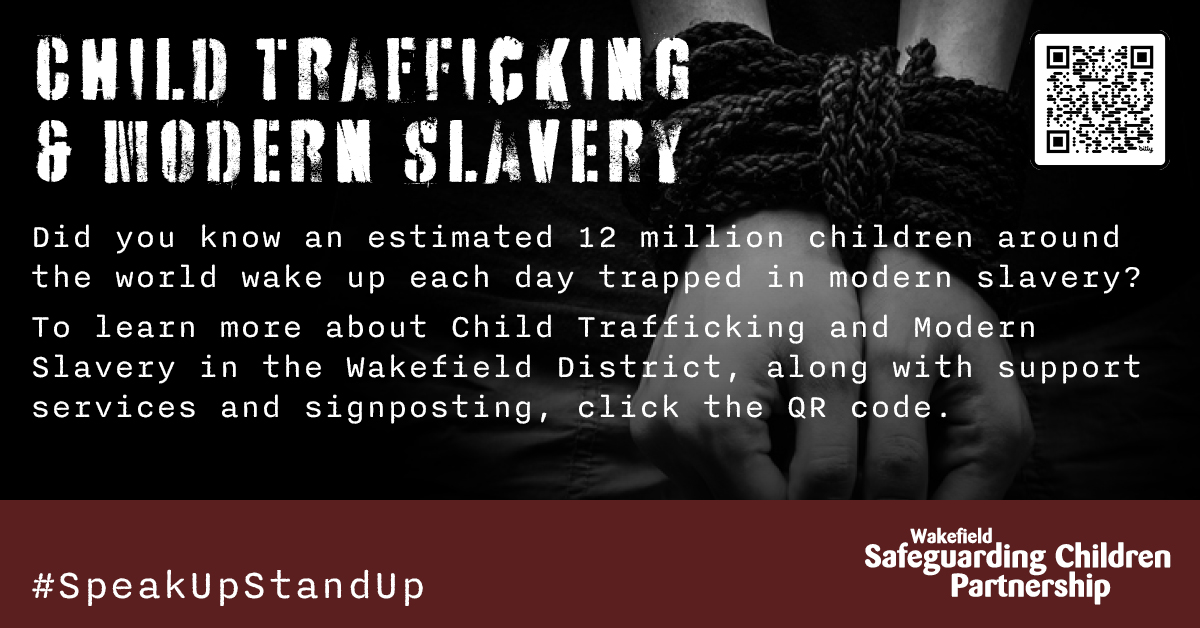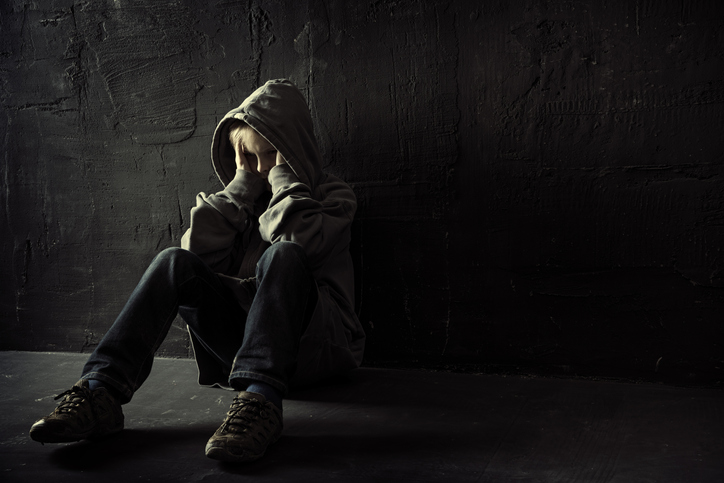Last reviewed January 2024
One Minute Guide to Child Trafficking
What is Child Trafficking?
Any form of trafficking children is abuse.
Trafficking is where children are tricked, forced or coerced to leave their homes and are moved or transported (within a country, town or city, a different part of a town or city they live in, or across borders whether by force or not), and then exploited, forced to work or sold. Children are trafficked for:
- Sexual and/or Criminal Exploitation
- Forced Marriage
- Forced Labour (factories, agriculture)
- Domestic Slavery (cooking, cleaning, childcare)
- Undertaking crimes, like theft, working on
cannabis farms or moving and selling drugs.
Trafficked children experience many types of abuse
and neglect. Traffickers use physical, sexual and
emotional abuse as a form of control. Children and are
also likely to be physically and emotionally neglected
and may be sexually abused.


Signs of child Trafficking may include:
- Carrying large amounts of cash and using it to pay for travel/ food
- Going missing from home and/or low attendance at school
- Appearing anxious, frightened, withdrawn, angry or showing signs of neglect
- Live in low-standard accommodation, being orphaned or living apart from family
- Be unsure which country, city or town they are in
- Traveling alone, including taxis /public transport
- Can’t or are reluctant to share personal information or where they live
- Not be registered with a school or GP practice
- Be seen in inappropriate places such as factories or brothels
- Carrying weapons
- Unexplained acquisition of money, clothes or mobile phone
- Have injuries from workplace accidents
- Give a prepared story which is very similar to stories given by other children
- Being in contact with known criminals or traffickers
- Rarely leaving their house and having no time to play
Effects of Child Trafficking
Trafficking can have both short-and long-term effects and the impact can last a lifetime.
Children who've been trafficked may:
- Not understand what's happened to them is abuse - especially if they've been groomed
- Believe they're in a relationship with their abuser and unaware they're being exploited and trafficked
- Think they played a part in their abuse or have broken the law
- Feel very guilty or ashamed about the abuse they've suffered
Being kept captive or living or working in poor conditions can have a serious impact on a child's mental and physical health. They might also be suffering from the effects of abuse and neglect.
Children may feel distressed and alienated if they've been separated from their families, friends, communities and cultures. They'll often have had no access to education or opportunity for social and emotional development.
Children exploited for domestic servitude and forced labour can suffer physical injuries, develop problems with their emotional health and be denied access to an education.
Children trafficked for sexual exploitation are at high risk of prolonged periods of sexual abuse, physical injuries, sexually transmitted infections and, for girls, multiple pregnancies.

What can help identify trafficking children?
Identification of trafficked children may be difficult as they may not show obvious signs of distress or abuse. Some children are unaware that they have been trafficked, while others may actively participate in hiding that they have been trafficked.
Listen out for slang terms that children or others might use.
Possible indicators include:
-
Show details
 At port of entry, the child...
At port of entry, the child... – has entered the country illegally, has no passport or means of identification or has false documentation;
– is accompanied by an adult who is not the parent;
– has a prepared story;
– has a mobile phone but no money;
– is unable to confirm the name and address of the person meeting them on arrival;
– is unable or is reluctant to give details of accommodation or other personal details.
-
Show details
 Whilst resident in the UK, the child...
Whilst resident in the UK, the child... – appear to have money but does have a mobile phone;
– has a history with gaps and frequent/unexplained moves or often goes missing;
– is being cared for by adult(s) who are not their parents;
– is one among a number of unrelated children found at one address;
– has not been registered with or attended a GP practice;
– has not been enrolled in school;
– appears to be undertaking excessive housework chores, has limited movement
-
Show details
 For children internally trafficked in the UK, indicators may include...
For children internally trafficked in the UK, indicators may include... – physical symptoms indicating physical or sexual abuse;
– the child persistently going missing; missing for long periods;
– returning looking well cared for despite having no known base;
– the child possessing large amounts of money;
– acquiring expensive clothes/mobile phones without plausible explanation;
– low self-image, low self-esteem, self-harming behaviour;
– truancy and disengagement with education
-
Show details
 Change in language...
Change in language... Listen out for slang terms that children or others might use.

How to report Child Trafficking
The safeguarding of children remains a priority for anyone who works with children.
Practitioners should receive regular and updated training on how to look out for signs of child exploitation, and the procedures to follow if they
suspect that it is happening.
If you suspect that a child has been trafficked use the Partnership Intelligence Portal (PIP) to share information or intelligence, or call 101 (999 if you consider it to be an emergency situation). It should be noted that the police will ask for your details, and that if you would like to report a suspicion of child trafficking anonymously, you should call Crimestoppers on 0800 555 111.
If it is suspected that a child is a victim of trafficking, then a first responder does not require the child’s consent to refer to the National Referral Mechanism (NRM). To report to the NRM, please click here.
You can also call the Modern Slavery Helpline anonymously on 0800 0121 700 if you have reason to suspect child exploitation


